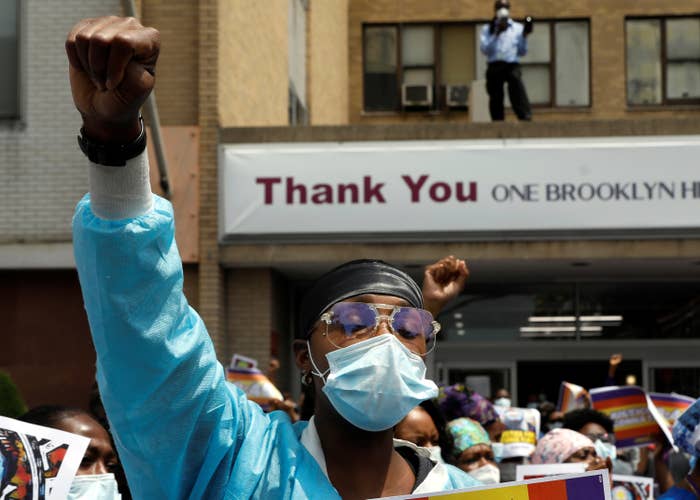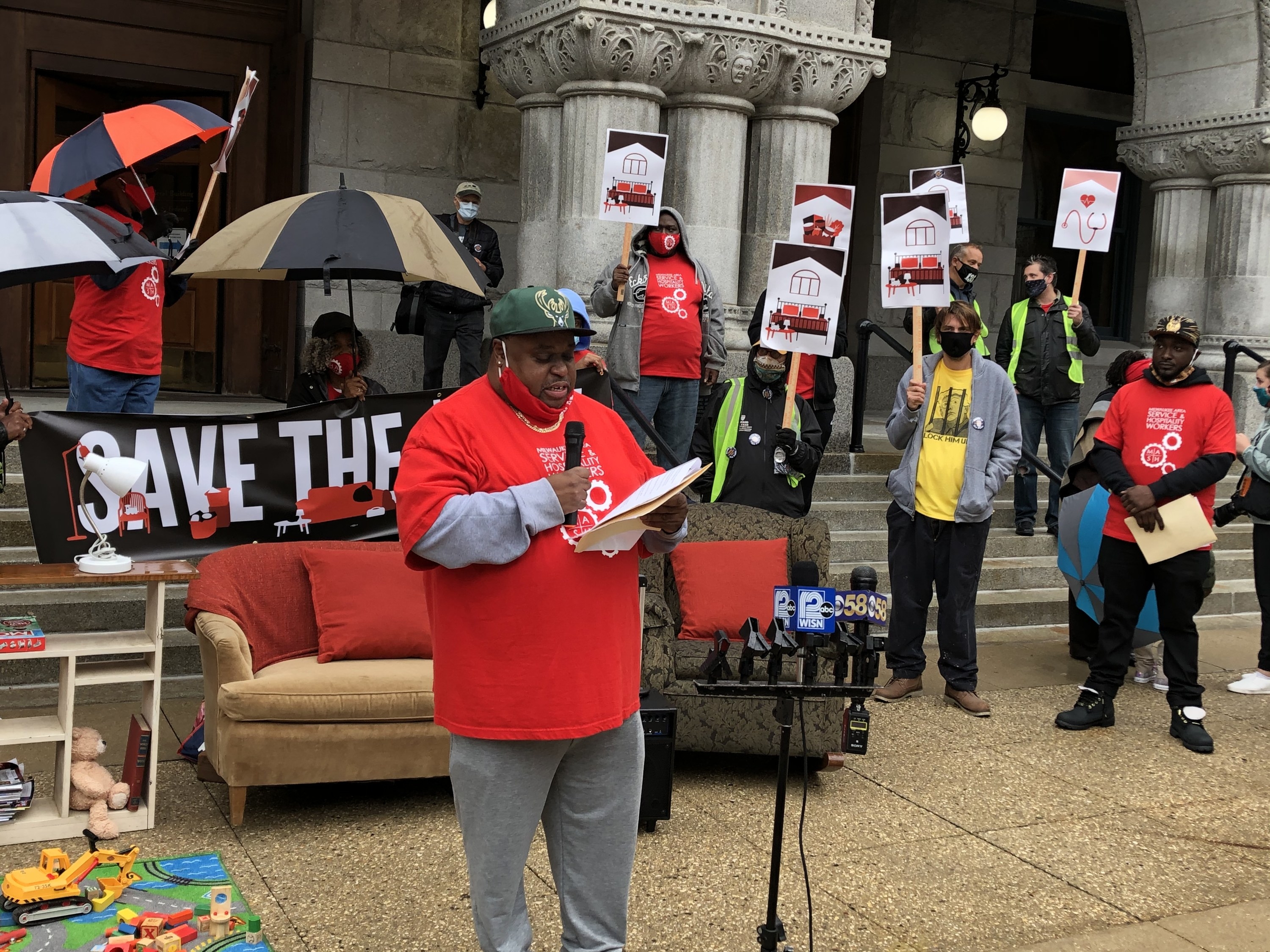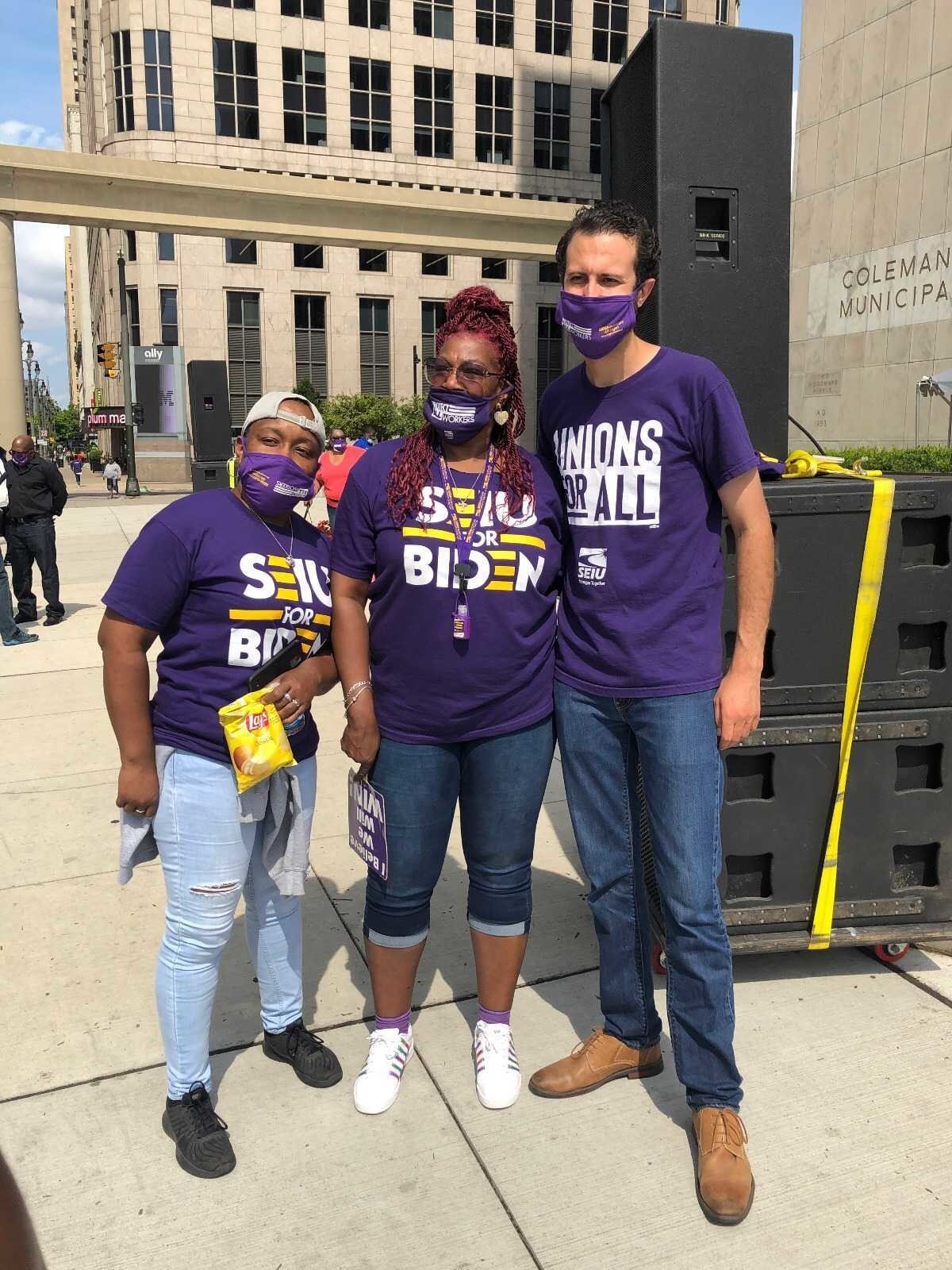
Hillary Rothrock, a home healthcare worker in Harrisburg, Pennsylvania, has been isolating at home with family since the coronavirus pandemic began. And she's been organizing.
She’s spent the past eight months pushing for more personal protective equipment, better wages, and renewed political leadership to fight the pandemic through her local union, SEIU Healthcare Pennsylvania. The months of work culminate on Election Day, where her state is one of the most closely watched in the country.
“COVID has impacted every part of our lives, even down to how we get our groceries and drinking water,” Rothrock told BuzzFeed News. “This election is a decision based upon our lives. We’re concerned with the way things have been going.”
The Service Employees International Union, which represents millions of frontline workers who have been hit hard by all aspects of the pandemic, has been making a large push to mobilize votes, particularly in key swing states like Pennsylvania, Wisconsin, Nevada, Michigan, and Florida.

“We’re looking to have elected officials in positions of government who take our plight seriously and who care about the lives of vulnerable Pennsylvanians like we do,” Rothrock said.
Since the pandemic began, she’s spent hours having conversations with over 3,500 other home healthcare workers in Pennsylvania about PPE shortages, the president’s response to the pandemic, and the circumstances of their own lives. She said the shared struggles that healthcare workers are facing have created a grassroots movement in their community that’s pushed them to call voters and make sure that people across their state take the election seriously.
Those efforts are part of a $150 million investment the union made in February in a nationwide campaign to defeat President Donald Trump. That was before a majority of the union — which represents healthcare workers, janitors, and food service workers — would have their lives changed by the pandemic.
Mary Kay Henry, the president of SEIU, told BuzzFeed News that the pandemic shifted the union’s focus away from traditional large-scale door-knocking programs to get out the vote. It quickly revamped its program to focus on phone-banking, with members organizing and speaking about the election in their workplaces and door-knocking in communities in Michigan, Wisconsin, and Florida.
“Our grief turned into righteous indignation about how our government and corporations were failing the vast majority of essential workers,” Henry told BuzzFeed News. “There was this irony to the idea that these workers were being held up as heroes and applauded every night and many of them don’t have the healthcare they need to look after themselves or paid two weeks of sick leave as a condition of work.”
Henry added that because half of the union’s membership is composed of people of color and women that it was important for them to speak to those communities and highlight the issues they’re facing. They’ve been focusing their voter turnout operations on healthcare, a $15 minimum wage, and the racial justice movement that surged across the country over the summer. “We know that essential workers are essential voters and that workers of color and their families showing up in this election are decisive to issues that matter to all working people,” she said.

“This election is about forcing the nation’s reckoning with economic and racial inequality,” Henry said. “Our program is rooted in the unnecessary loss of life from our members, and then got connected to the Movement for Black Lives’ strong set of demands to improve the lives of Black and brown people during the uprising over the summer, and the fight for $15 organizers that have been in the streets for seven years.”
Trece Andrews, a nursing home worker and union organizer with SEIU Healthcare Michigan in Detroit, faced similar situations at the start of the pandemic, when workers at her facility experienced shortages of masks and gloves that they needed to protect themselves and their patients. “I knew that our country wasn’t prepared for the pandemic and it sent me into panic mode,” she said.
Andrews has also spent the past few months organizing with SEIU to talk to other healthcare workers and her community about the issues and to push them to turn out and vote. “We want leadership that actually cares about us,” Andrews said. “We want people to know that healthcare, wages, racism, compassion, democracy, justice, and economics are on the ballot. We want to be able to afford to take care of our families.”

The push from SEIU in the final weeks of the election came during a critical time in the country’s response to the pandemic. While Trump has called the pandemic a “Fake News Media Conspiracy Theory” and downplayed surges in positive test rates, more than 230,000 Americans have died from COVID-19 and cases have continued to rise. The economy has been hit hard as industries have fired and furloughed workers throughout the pandemic.
An early October poll from Pew Research found that 74% of registered voters said that the economy was an important issue for their vote and 55% rated the coronavirus pandemic as an important issue.
Troy Brewer, who lost the three food service jobs he was working in Milwaukee, has been organizing in Wisconsin around fair wages and better unemployment protections, which he and others like him say have impacted frontline workers who have no safety funds in the event they contract COVID-19.
Brewer, a 50-year-old father of three and a MASH union member, has been without work since the sports stadiums where he ran restaurants shuttered. “Things are worse now than when the pandemic first started,” he said. “It took me more than two and a half months to get the unemployment issue sorted out, and when we got laid off we thought, Maybe it’ll be two weeks.’ It’s been nine months, and this administration hasn’t figured out how to get things under control at all. They even had an outbreak at the White House, so that’s telling you a lot.”
Brewer said that he’s been organizing in his community because of the botched response and the back-and-forth over extra unemployment insurance benefits in a new stimulus package after benefits for laid-off workers ran out in July.
“We’re just disgusted with the last four years. A lot of the people that we’re talking to in our communities are coming in to vote for the first time because of what they’ve seen happen over the last few months,” Brewer said. “I’ve never seen so many calls, flyers, people knocking on doors. I’ve been voting for a long time — this is maybe the biggest election of my lifetime. People are fed up.”
